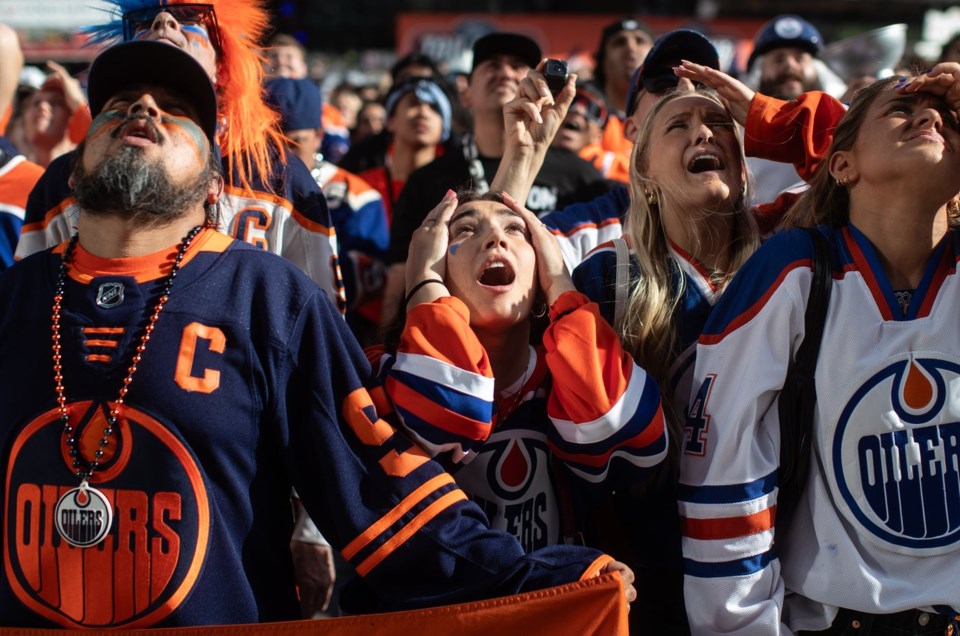EDMONTON — The hearts of Edmonton Oilers fans shattered Monday night as the team lost Game 7 of the Stanley Cup final.
On Tuesday, many were still trying to put the pieces back together.
"I wore all black to work. I'm in mourning," said Jamie Cessford, an Oilers fan who lives in Vancouver. "I'm definitely still reeling a bit."
Cessford was clad in an orange Jordan Eberle jersey Monday night as he sat in a bar in downtown Seattle watching the Florida Panthers edge the Oilers 2-1 to capture the championship.
He and his friend were silent for much of the third period as Edmonton pressed, trying in vain to tie the game. After the final horn sounded, they walked to a concert nearby and Cessford thought back to the last time he'd cheered Edmonton on in a Stanley Cup final.
That was 2006, when the Oilers lost to the Carolina Hurricanes.
"I was just like, 'Man, this doesn't get any easier as you age,'" Cessford said. "The sports pain is still real as you reach your mid-to-late 30s.”
Samantha Woj turned to canvas to process her feelings on Tuesday.
“I’m actually so sad today and I’m like ‘I just need to do a painting,'" Woj, an artist who uses sports equipment to paint, said in a phone interview, a football in her hand. "Art is pretty much my way to channel my emotions.”
A video of Woj using a hockey stick to paint a portrait of Oilers goalie Stuart Skinner drew praise during the playoffs.
Edmonton's post-season success is bittersweet, she said, because though it ended in disappointment, cheering brought people together.
“You can’t be too mad, be too upset," Woj said. "It hurts, but you can’t be too upset because everyone’s being so welcoming and so nice.”
For Oilers fan Craig Baird, the disappointment was accompanied by a serious sugar crash.
Before each game Edmonton played during the playoffs, Baird bought Oilers-themed doughnuts to enjoy while watching, sharing photos of the treats on social media. He had seven for Monday's Game 7 — plus one Edmonton Elks-themed doughnut for some extra good luck.
“It has no real bearing on the game whatsoever, but you feel like you’re part of it in a way," he said.
Baird watched the game at home, filled with nerves and anticipation.
“It was a lot of walking around," he said. "I wasn’t really able to sit there and watch the game, especially in the third period when we were down one goal. And obviously the massive amount of sugar probably played a role.”
The result wasn't what Baird and other Oilers fans wanted to see, but he's keeping the playoff run in perspective.
“Obviously there’s disappointment, because we want the Oilers to win the Cup, we want to bring the Cup back to Canada. But in the end, I’m proud of the team," he said.
That's the right approach to take, said Ben Schellenberg, an assistant professor of psychology at the University of Manitoba.
“One of the things to remember is that (the disappointment) will go away," said Schellenberg, who studies the psychology of sports fandom. "The beauty of sport is there’s always a new season around the corner. And I guess the Edmonton Oilers have a pretty good team, so there’s always next year.”
For many fans, cheering for a team becomes part of their identity. There are social benefits to fandom, Schellenberg said, such as connecting with like-minded people and feeling a sense of belonging.
For some, though, being a fan can have negative impacts when they can't let the outcome of a game go.
There's some evidence that shows fans with "high levels of obsessive passion" aren't fulfilled in other parts of their life, Schellenberg said.
“That's sort of a dangerous recipe, because then you're gonna kind of latch on to being an Oilers fan. And that's going to kind of consume you," he said.
“Basically, the recommendation is to kind of have a balanced life, to make sure you're being fulfilled in multiple areas of your life."
Robert Vallerand, a psychology professor at the Université du Québec à Montréal, said sports fandom is much like any other passion — with one important distinction.
People's identities get tied up with their team. When a super-fan's team loses, it's like they've lost, too.
And because the Oilers were part of a de facto competition between Canada and the United States, he said, it may have made things all the tougher for fans.
"People may have lost twice," Vallerand said. "Both as an Oilers fan and as a Canadian."
— With files from Nicole Thompson in Toronto
This report by The Canadian Press was first published June 25, 2024.
Gemma Karstens-Smith, The Canadian Press


